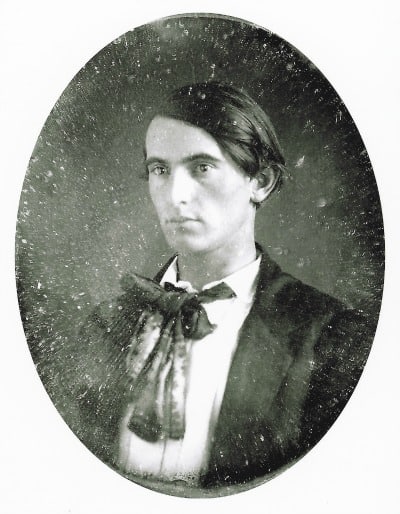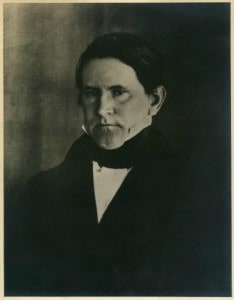
As a youth, Lew Wallace managed to develop a reputation as a truant and a rascal. He used any number of excuses to avoid education and undertake adventure in the great outdoors. He joined “The Red Eye and the Hay Press Club,” a group of boys who met in a loft accessible only by a trap door. The boys raided gardens, pulled bell ropes, and generally created havoc as they ran through the countryside.
Education at Political Rallies
In 1840, his truancy hit a new level. A huge rally was planned in Battle Ground, Indiana, in support of William Henry Harrison’s bid for president. This promised to be far more interesting to the thirteen-year-old Lew than any classroom studies.
Twenty thousand Whig supporters and delegates converged on the tiny community a few miles north of Lafayette. The procession travelling Indianapolis was twenty-five miles long. With his father away on business, Lew decided to join this parade as it headed north. Lew didn’t bother telling his stepmother Zerelda about his plans.
Fortunately, one of Lew’s uncles saw him on the road and got word back to the family. Lew stayed at this “Log Cabin and Hard Cider” rally for almost two weeks. As the rally concluded, a church revival started up. Lew stayed to see part of that enterprise before finally wandering the seventy or so miles back to Indianapolis.
Education Through Travel
A few years later, Lew and his friend Aquilla Cook determined to create their own “Huckleberry Finn” adventure. The son of John Cook, first State House librarian, Aquilla Cook disappeared from history a few years after his adventure with Lew Wallace. He married a dancer in Cincinnati and killed a man who made unwelcome advances to his wife. Then Aquilla escaped arrest. Not content to escape without a word, he wrote a letter to a Cincinnati newspaper boasting about fooling the police.

However, years before this drama played out, Wallace and Cook read about the Alamo and the heroics of the freedom fighters in Texas. The teenagers decided it was their duty to reinforce Commodore Moore of the Texan Navy. Although they failed to recruit others to join them, the two boys commandeered a skiff.
They began floating down the White River, intent on finding a flatboat headed to New Orleans. Lew’s step-grandfather, Dr. John Sanders, foiled their plan when he and a local constable caught up with the boys.
Lew’s Father Gives Up
This adventure was the one that finally led to Lew Wallace’s father to throw up his hands and throw in the towel. As Lew reported in his autobiography, his father said:
Were I to die tonight, your portion of my estate would not keep you a month. I have struggled to give you and your brothers what, in my opinion, is better than money—education. Since your sixth year, I have paid school-bills for you; but—one day you will regret the opportunities you have thrown away. I am sorry, disappointed, mortified; so, without shutting the door upon you, I am resolved that from today you must go out and earn your own livelihood. I shall watch your course hopefully.
Education Himself
It took a few more years and a few more adventures before David Wallace began to see his son settle down. Eventually, Lew grew in resolve and focused on accomplishments that brought credit to the Wallace name. Throughout his life, Lew Wallace adored and respected his father. Just as David Wallace predicted, Lew grew to understand what had been lost when he squandered his education. He grew to be a man who learned by experience, read voraciously, challenged himself routinely, and became a devoted life-long learner.
While Lew Wallace’s time in the classroom may have been a disappointment, perhaps his education was not truly squandered—he was just a boy who never let school get in the way of his learning.
Sources:
“The Early Life of Lew Wallace,” Indiana Magazine of History, September 1941 by Irving McKee.